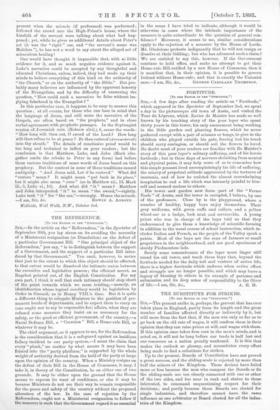THE REFERENDUM.
[TO THE EDITOR, OF THE " ELPEOTATOE,"] SIR,—In the article on the " Referendum," in the Spectator of September 30th, you lay stress on its avoiding the necessity of a Ministerial resignation (or Dissolution) on the defeat of a particular Government Bill. "One principal object of the Referendum," you say, " is to distinguish between the support of a Government, and the support of a particular Bill intro- duced by that Government." You omit, however, to notice that just to the extent to which this object should be effected, to that extent would be dissolved the intimate union between the executive and legislative powers ; the efficient secret, as Bagehot pointed out, of the English Constitution. For my own part, I think it well that such intimacy should stop short of the point towards which we seem tending,—namely, an identification whose logical corollary would be legislation by Order in Council, as in Henry VIII.'s time. But it is quite a different thing to relegate Ministers to the position of per- manent heads of departments, and to expect them to carry on (one ought not to say be responsible for) affairs, when they are refused some measure they insist on as necessary for the safety, or the good or efficient government, of the country,—a Naval Defence Bill, a " Coercion" Bill, a Home-rule Bill, or whatever it may be.
The chief argument, as it appears to me, for the Referendum is the consideration that it is a safeguard against an insidious fallacy incident to our party system,—I mean the claim that every "plank," no matter by what means it may have been foisted into the " party platform," is supported by the whole weight of authority derived from the hold of the party at large upon the opinion of the country. When a Ministry resigns on the defeat of their Bill in the House of Commons, it may, I take it, in theory of the Constitution, be on either one of two grounds. It may be either upon the ground that the House means to express its want of confidence, or else it may be because Ministers do not see their way to remain responsible for the peace and safety of the country without the proposed alteration of the law. In the case of rejection by the Referendum, ought not a Ministerial resignation to follow if the measure is such that the Government regard it as essential in the sense I have tried to indicate, although it would be otherwise in cases where the intrinsic importance of the measure is quite subordinate to the question of general con- fidence ? Moreover, it seems to me, similar considerations apply to the rejection of a measure by the House of Lords. Mr. Gladstone protests indignantly that he will not resign or dissolve at their bidding ; but who has advanced such a claim ? We are entitled to say this, however. If the Government continue to hold office, and make no attempt to get their Home-rule Bill ratified by a new House of Commons, then it is manifest that, in their opinion, it is possible to govern Ireland without Home-rule; and that is exactly the Unionist case.—I am, Sir, &o., GEORGE CARSLARE THOMPSON.






































 Previous page
Previous page